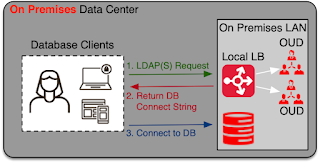One very common use case is Oracle Database name resolution. Oracle name resolution is referred to by several names including "net services", Transparent Network Substrate (TNS), and Oracle Names (ONAMES) depending on the Oracle Database version.
(DESCRIPTION =
(ADDRESS=(PROTOCOL=TCP)(HOST=node1.example.com)(PORT=1521))
(CONNECT_DATA=(SERVICE_NAME=node1.example.com))
)
$ sudo mkdir /opt/oud/bits
$ sudo chown -R opc:opc /opt/oud
- JDK is available at https://www.oracle.com/technetwork/java/javase/downloads/jdk8-downloads-2133151.html
- Download the latest Linux x64 gz version, which is currently jdk-8u381-linux-x64.tar.gz
- OUD is available from eDelivery at https://edelivery.oracle.com/
- Login and search for Oracle Directory Services Plus 12.2.1.4.0
- Download V983402-01.zip
- Patches
- OPatch: https://updates.oracle.com/download/28186730.html (p28186730_139427_Generic.zip)
- OUD: https://updates.oracle.com/download/35263333.html (p35263333_122140_Generic.zip)
$ tar --directory=/opt/oud -zxf /opt/oud/bits/jdk-8u*-linux-x64.tar.gz
$ mv /opt/oud/jdk1.8.0* /opt/oud/jdk
$ unzip -d /opt/oud/bits/. /opt/ods/poc/bits/V983402-01.zip
$ unzip -d /opt/oud/bits/. /opt/ods/poc/bits/p28186730_139427_Generic.zip
$ unzip -d /opt/oud/bits/. /opt/ods/poc/bits/p35263333_122140_Generic.zip
OUD installation response file (/opt/oud/bits/oud12c-standalone.rsp):
[ENGINE]
Response File Version=1.0.0.0.0
[GENERIC]
DECLINE_AUTO_UPDATES=true
MOS_USERNAME=
MOS_PASSWORD=
AUTO_UPDATES_LOCATION=
SOFTWARE_UPDATES_PROXY_SERVER=
SOFTWARE_UPDATES_PROXY_PORT=
SOFTWARE_UPDATES_PROXY_USER=
SOFTWARE_UPDATES_PROXY_PASSWORD=
ORACLE_HOME=/opt/oud/mw_oud12c
INSTALL_TYPE=Standalone Oracle Unified Directory Server (Managed independently of WebLogic server)
Oracle inventory file (/opt/oud/bits/oraInventory.loc)
inventory_loc=/opt/oud/oraInventory
inst_group=opc
Temporary password file for setup (/opt/oud/bits/.pw)
$ echo 'Oracle123' > /opt/oud/bits/.pw
Java security configuration file (/opt/oud/bits/tns-java.security) that allows anonymous cipher suites, which are required for registering databases with dbca
jdk.disabled.namedCurves = secp112r1, secp112r2, secp128r1, secp128r2, \
secp160k1, secp160r1, secp160r2, secp192k1, secp192r1, secp224k1, \
secp224r1, secp256k1, sect113r1, sect113r2, sect131r1, sect131r2, \
sect163k1, sect163r1, sect163r2, sect193r1, sect193r2, sect233k1, \
sect233r1, sect239k1, sect283k1, sect283r1, sect409k1, sect409r1, \
sect571k1, sect571r1, X9.62 c2tnb191v1, X9.62 c2tnb191v2, \
X9.62 c2tnb191v3, X9.62 c2tnb239v1, X9.62 c2tnb239v2, X9.62 c2tnb239v3, \
X9.62 c2tnb359v1, X9.62 c2tnb431r1, X9.62 prime192v2, X9.62 prime192v3, \
X9.62 prime239v1, X9.62 prime239v2, X9.62 prime239v3, brainpoolP256r1, \
brainpoolP320r1, brainpoolP384r1, brainpoolP512r1
jdk.tls.disabledAlgorithms=SSLv3, TLSv1, TLSv1.1, RC4, DES, MD5withRSA, \
DH keySize < 1024, EC keySize < 224, 3DES_EDE_CBC, NULL, \
include jdk.disabled.namedCurves
jdk.tls.legacyAlgorithms= \
K_NULL, C_NULL, M_NULL, \
DH_anon, ECDH_anon, \
RC4_128, RC4_40, DES_CBC, DES40_CBC, \
3DES_EDE_CBC
$ export JAVA_HOME=/opt/oud/jdk
$ $JAVA_HOME/bin/java -d64 -jar /opt/oud/bits/fmw_12.2.1.4.0_oud.jar -silent -ignoreSysPrereqs -responseFile /opt/oud/bits/oud12c-standalone.rsp -invPtrLoc /opt/oud/bits/oraInventory.loc
Set ORACLE_HOME environment variable
$ export ORACLE_HOME=/opt/oud/mw_oud12c
List patch inventory to see current OUD version and what patches are installed
$ $ORACLE_HOME/OPatch/opatch lsinventory
Install the OPatch patch
$ cd /opt/oud/bits/6880880
$ $JAVA_HOME/bin/java -jar /opt/oud/bits/6880880/opatch_generic.jar -silent oracle_home=$ORACLE_HOME
Install OUD patch responding interactively with y to both questions
cd /opt/oud/bits/35263333
$ $ORACLE_HOME/OPatch/opatch apply
List patch inventory to see compare with previous lsinventory output
$ $ORACLE_HOME/OPatch/opatch lsinventory
$ export OPENDS_JAVA_ARGS="-Djava.security.properties=/opt/oud/bits/tns-java.security"
Note: Whenever you restart an OUD instance, you will want to set the OPENDS_JAVA_ARGS environment variable before starting the OUD instance.
$ /opt/oud/mw_oud12c/oud/oud-setup --cli --integration eus --instancePath /opt/oud/mw_oud12c/oud1/OUD --adminConnectorPort 1444 --ldapPort 1389 --ldapsPort 1636 --httpAdminConnectorPort disabled --httpPort disabled --httpsPort disabled --baseDN dc=world --rootUserDN 'cn=Directory Manager' --rootUserPasswordFile /opt/oud/bits/.pw --addBaseEntry --generateSelfSignedCertificate --hostName $(hostname -f) --noPropertiesFile --no-prompt
$ /opt/oud/mw_oud12c/oud/oud-setup --cli --integration eus --instancePath /opt/oud/mw_oud12c/oud2/OUD --adminConnectorPort 2444 --ldapPort 2389 --ldapsPort 2636 --httpAdminConnectorPort disabled --httpPort disabled --httpsPort disabled --baseDN dc=world --rootUserDN 'cn=Directory Manager' --rootUserPasswordFile /opt/oud/bits/.pw --addBaseEntry --generateSelfSignedCertificate --hostName $(hostname -f) --noPropertiesFile --no-prompt
$ /opt/oud/mw_oud12c/oud2/OUD/bin/dsreplication enable --host1 $(hostname -f) --port1 1444 --bindDN1 'cn=Directory Manager' --bindPasswordFile1 /opt/oud/bits/.pw --replicationPort1 1989 --secureReplication1 --host2 $(hostname -f) --port2 2444 --bindDN2 'cn=Directory Manager' --bindPasswordFile2 /opt/oud/bits/.pw --replicationPort2 2989 --secureReplication2 --baseDN dc=world --adminUID admin --adminPasswordFile /opt/oud/bits/.pw --trustAll --no-prompt
$ /opt/oud/mw_oud12c/oud1/OUD/bin/dsreplication status --hostname $(hostname -f) --port 1444 --dataToDisplay compact-view --adminUID admin --adminPasswordFile /opt/oud/bits/.pw --advanced --trustAll --no-prompt
Create /opt/oud/bits/tns.batch configuration file with the following content
set-connection-handler-prop --handler-name "LDAPS Connection Handler" --add ssl-cipher-suite:TLS_DH_anon_WITH_AES_256_GCM_SHA384 --add ssl-cipher-suite:TLS_DH_anon_WITH_AES_128_GCM_SHA256
create-password-policy --type generic --policy-name TNSAdmins --set password-attribute:userpassword --set default-password-storage-scheme:AES --set default-password-storage-scheme:Salted\ SHA-512
set-password-policy-prop --policy-name "Default Password Policy" --add default-password-storage-scheme:"EUS PBKDF2 SHA-512"
set-log-publisher-prop --publisher-name "File-Based Access Logger" --set enabled:true
Apply the eus.batch configuration file to OUD1
$ /opt/oud/mw_oud12c/oud1/OUD/bin/dsconfig -h $(hostname -f) -p 1444 -D 'cn=Directory Manager' -j /opt/oud/bits/.pw --batchFilePath /opt/oud/bits/tns.batch --no-prompt
Apply the eus.batch configuration file to OUD2
$ /opt/oud/mw_oud12c/oud1/OUD/bin/dsconfig -h $(hostname -f) -p 2444 -D 'cn=Directory Manager' -j /opt/oud/bits/.pw --batchFilePath /opt/oud/bits/tns.batch --no-prompt
Set OPENDS_JAVA_ARGS to use custom java.security and then restart OUD instances to apply cryptographic changes
$ export OPENDS_JAVA_ARGS="-Djava.security.properties=/opt/oud/bits/tns-java.security"
Stop OUD1 and OUD2
$ /opt/oud/mw_oud12c/oud1/OUD/bin/stop-ds
$ /opt/oud/mw_oud12c/oud2/OUD/bin/stop-ds
Start OUD1 and OUD2
$ /opt/oud/mw_oud12c/oud1/OUD/bin/start-ds
$ /opt/oud/mw_oud12c/oud2/OUD/bin/start-ds
dn: ou=TNSAdmins,cn=OracleContext
changetype: add
objectClass: top
objectClass: organizationalUnit
ou: TNSAdmins
dn: cn=tnsadmin,ou=TNSAdmins,cn=oracleContext
changetype: add
objectClass: top
objectClass: organizationalperson
objectClass: inetorgperson
uid: cn=tnsadmin,ou=TNSAdmins,cn=oracleContext
cn: tnsadmin
sn: TNS
givenName: Admin
userPassword: Oracle123
ds-privilege-name: password-reset
ds-privilege-name: unindexed-search
ds-privilege-name: modify-acl
ds-pwp-password-policy-dn: cn=TNSAdmins,cn=Password Policies,cn=config
dn: cn=Common,cn=Products,cn=OracleContext
changetype: modify
replace: orclSubscriberSearchBase
orclSubscriberSearchBase: dc=world
dn: cn=Common,cn=Products,cn=OracleContext
changetype: modify
replace: orclSubscriberNickNameAttribute
orclSubscriberNickNameAttribute: dc
dn: cn=Common,cn=Products,cn=OracleContext
changetype: modify
replace: orclDefaultSubscriber
orclDefaultSubscriber: dc=world
dn: cn=Common,cn=Products,cn=OracleContext,dc=world
changetype: modify
replace: orclCommonUserSearchBase
orclCommonUserSearchBase: ou=People,dc=world
dn: cn=Common,cn=Products,cn=OracleContext,dc=world
changetype: modify
replace: orclCommonUserCreateBase
orclCommonUserCreateBase: ou=People,dc=world
dn: cn=Common,cn=Products,cn=OracleContext,dc=world
changetype: modify
replace: orclCommonDefaultUserCreateBase
orclCommonDefaultUserCreateBase: ou=People,dc=world
dn: cn=Common,cn=Products,cn=OracleContext,dc=world
changetype: modify
replace: orclCommonGroupCreateBase
orclCommonGroupCreateBase: ou=Groups,dc=world
dn: cn=Common,cn=Products,cn=OracleContext,dc=world
changetype: modify
replace: orclCommonDefaultGroupCreateBase
orclCommonDefaultGroupCreateBase: ou=Groups,dc=world
dn: cn=Common,cn=Products,cn=OracleContext,dc=world
changetype: modify
replace: orclCommonGroupSearchBase
orclCommonGroupSearchBase: ou=Groups,dc=world
dn: cn=Common,cn=Products,cn=OracleContext,dc=world
changetype: modify
replace: orclCommonNicknameAttribute
orclCommonNicknameAttribute: uid
dn: cn=Common,cn=Products,cn=OracleContext,dc=world
changetype: modify
replace: orclCommonKrbPrincipalAttribute
orclCommonKrbPrincipalAttribute: userPrincipalName
dn: cn=Common,cn=Products,cn=OracleContext,dc=world
changetype: modify
replace: orclCommonNamingAttribute
orclCommonNamingAttribute: cn
dn: cn=Common,cn=Products,cn=OracleContext,dc=world
changetype: modify
replace: orclCommonWindowsPrincipalAttribute
orclCommonWindowsPrincipalAttribute: samAccountName
dn: cn=OracleContextAdmins,cn=groups,cn=OracleContext,dc=world
changetype: modify
add: uniqueMember
uniqueMember: cn=tnsadmin,ou=TNSAdmins,cn=oracleContext
dn: cn=OracleDomainAdmins,cn=OracleDefaultDomain,cn=OracleDBSecurity,cn=Products,cn=OracleContext,dc=world
changetype: modify
add: uniqueMember
uniqueMember: cn=tnsadmin,ou=TNSAdmins,cn=oracleContext
dn: cn=PolicyCreators,cn=Policies,cn=LabelSecurity,cn=Products,cn=OracleContext,dc=world
changetype: modify
add: uniqueMember
uniqueMember: cn=tnsadmin,ou=TNSAdmins,cn=oracleContext
dn: cn=OracleDBCreators,cn=OracleContext
changetype: modify
add: uniqueMember
uniqueMember: cn=tnsadmin,ou=TNSAdmins,cn=oracleContext
dn: cn=OracleNetAdmins,cn=OracleContext
changetype: modify
add: uniqueMember
uniqueMember: cn=tnsadmin,ou=TNSAdmins,cn=oracleContext
dn: cn=OracleContextAdmins,cn=Groups,cn=OracleContext
changetype: modify
add: uniqueMember
uniqueMember: cn=tnsadmin,ou=TNSAdmins,cn=oracleContext
dn: cn=OracleUserSecurityAdmins,cn=Groups,cn=OracleContext
changetype: modify
add: uniqueMember
uniqueMember: cn=tnsadmin,ou=TNSAdmins,cn=oracleContext
dn: cn=OracleNetAdmins,cn=OracleContext,dc=world
changetype: modify
add: uniqueMember
uniqueMember: cn=tnsadmin,ou=TNSAdmins,cn=oracleContext
dn: cn=OracleDBCreators,cn=OracleContext,dc=world
changetype: modify
add: uniqueMember
uniqueMember: cn=tnsadmin,ou=TNSAdmins,cn=oracleContext
$ /opt/oud/mw_oud12c/oud/bin/ldapmodify -h $(hostname -f) -Z -X -p 1636 -D 'cn=Directory Manager' -j /opt/oud/bits/.pw -c -f /opt/oud/bits/tns.realm
Sample sqlnet.ora illustrating the insertion of LDAP into the NAMES.DIRECTORY_PATH variable
NAMES.DIRECTORY_PATH= (LDAP,TNSNAMES, EZCONNECT)
Sample ldap.ora
DIRECTORY_SERVERS= (ol8.example.com:1389:1636,ol8.example.com:2389:2636)
DEFAULT_ADMIN_CONTEXT = "dc=world"
DIRECTORY_SERVER_TYPE = OID
Set Oracle database environment
$ export ORACLE_HOME=/opt/ods/poc/db/19c/dbhome_1
$ export ORACLE_BASE=/opt/ods/poc/db/19c/app/oracle
$ export TNS_ADMIN=/opt/ods/poc/db/19c/dbhome_1/network/admin
$ export ORACLE_SID=ol8
Register CDB database
$ /opt/ods/poc/db/19c/dbhome_1/bin/dbca -silent -configureDatabase -sourceDB $ORACLE_SID -registerWithDirService true -dirServiceUserName cn=tnsadmin,ou=TNSAdmins,cn=oracleContext -dirServicePassword Oracle123 -walletPassword Oracle123
Register PDB database
$ $ORACLE_HOME/bin/dbca -silent -configurePluggableDatabase -pdbName PDB1 -sourceDB $ORACLE_SID -registerWithDirService true -dirServiceUserName cn=tnsadmin,ou=TNSAdmins,cn=oracleContext -dirServicePassword Oracle123 -walletPassword Oracle123
Lookup container database (CDB)
$ $ORACLE_HOME/bin/tnsping $ORACLE_SID
Lookup pluggable database (PDB)
$ $ORACLE_HOME/bin/tnsping PDB1_$ORACLE_SID
List all registered databases
$ /opt/oud/mw_oud12c/oud/bin/ldapsearch -T -h $(hostname -f) -p 1636 -X -Z -D cn=tnsadmin,ou=TNSAdmins,cn=oracleContext -j /opt/oud/bits/.pw -b dc=world -s sub '(|(objectClass=orclDBServer)(objectClass=orclNetService))'

No comments:
Post a Comment